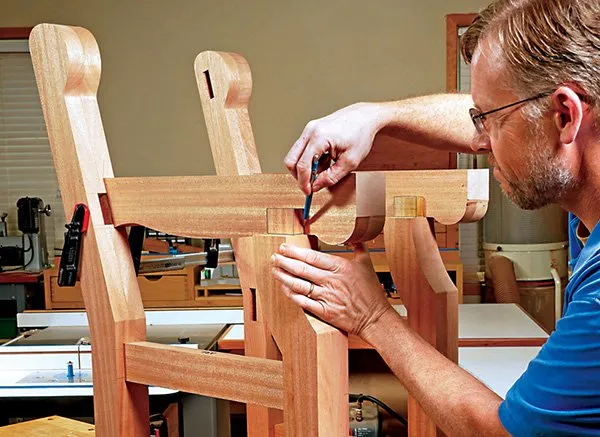Carpentry courses in South Africa can be studied in several kinds of technical and vocational education and training (TVET) colleges, as well as private institutions, and trade schools. These courses range from short skill development programs to comprehensive qualifications such as National Certificates.
Do you enjoy crafting or creating with wood? Do you pay close attention to detail and appreciate accuracy in your work? Then you might be a good fit for the position of carpenter. Here is all of the information you need to become a carpenter.
In this article, we will look at the top 15 carpentry courses in South Africa, along with their fees, duration and requirements.
Table of contents
- What Does A Carpenter Do?
- Top 15 Carpentry Courses In South Africa
- Carpentry Courses In South Africa Requirements
- Carpentry Courses Fees in South Africa
- Where Can You Study Carpentry in South Africa?
- How Long Does It Take to Learn Carpentry
- What Duties and Tasks Does a Carpenter Perform
- Career Opportunities Of Carpentry Courses In South Africa
- FAQs
- Conclusion
- Reference
- Recommendation
What Does A Carpenter Do?
Carpenters are skilled craftspeople who work in the construction and cabinetmaking industries. They manufacture various wood construction projects, such as kitchen installations, flooring, and building roofing.
See also: Top 15 Vocational courses in South Africa | 2025 Fee Structure
Top 15 Carpentry Courses In South Africa
Here are the top 15 best carpentry courses in South Africa:
- Short Skills Program in Carpentry
- Apprenticeship in Carpentry
- Advanced Carpentry and Joinery Course
- Learnerships in Carpentry
- Cabinet Making
- Kitchen units Carpentry
- Ceiling Carpentry
- Adding shelves.
- Rough carpentry
- Joister carpentry
- Cabinet carpentry
- Trim carpentry
- Kitchen carpentry
- Framer carpentry
- Roofer carpentry
#1. Short Skills Program in Carpentry
This program is designed for individuals looking to gain basic carpentry skills quickly. It focuses on foundational carpentry techniques such as cutting, shaping, and assembling wooden structures.
Duration:
Typically, this course lasts between 2 to 6 months, depending on the provider.
Cost:
Costs can vary, but it generally range from R5,000 to R12,000.
Where to study:
- South African College of Applied Psychology (SACAP)
- Various private training centers across South Africa
#2. Apprenticeship in Carpentry
An apprenticeship is a practical, hands-on training program where students work under the guidance of experienced carpenters.
It combines on-the-job experience with classroom learning, leading to a qualification as a certified carpenter.
Duration:
Usually 3 to 4 years.
Cost:
The cost is often low as apprenticeships are typically paid, and the student earns while learning.
Where to study:
- Construction Education and Training Authority (CETA)
- Various trade schools and companies offering apprenticeships
#3. Advanced Carpentry and Joinery Course
This course covers advanced carpentry skills, including precision joinery, advanced woodworking techniques, and the use of specialized tools. Students will learn to create high-quality furniture, doors, and windows.
Duration:
Typically 6 to 12 months.
Cost:
Approximately R10,000 to R15,000.
Where to study:
- Cape Town School of Carpentry
- Vega School
#4. Learnerships in Carpentry
Learnerships are structured programs that combine theoretical learning with practical experience.
In carpentry, learnerships often lead to a national qualification and include work placements with companies.
Duration:
It usually lasts 1 to 3 years.
Cost:
Learnerships are usually funded by employers or government agencies, so they may not require a fee.
Where to study:
- Construction Education and Training Authority (CETA)
- Various training centers offering learnerships with companies
#5. Cabinet Making
This course focuses on the art of creating cabinets, furniture, and other wooden structures. Students learn how to measure, cut, assemble, and finish cabinets with a professional touch.
Duration:
Typically 6 to 12 months.
Cost:
R6,000 to R12,000, depending on the provider.
Where to study:
- Vega School
- Damelin
- CTU Training Solutions
#6. Kitchen Units Carpentry
This course specializes in creating kitchen units, including cabinets, countertops, and shelves. Students learn to design and construct these elements to fit specific kitchen layouts.
Duration:
Around 6 months.
Cost:
R8,000 to R12,000.
Where to study:
- International Hotel School
- The Woodworking Academy of South Africa
#7. Ceiling Carpentry
Ceiling carpentry focuses on the installation of ceiling boards, insulation, and other overhead structures in both residential and commercial properties.
Duration:
Usually 3 to 6 months.
Cost:
R4,000 to R8,000.
Where to study:
- Tshwane University of Technology
- Various local trade colleges
#8. Adding Shelves
This practical course teaches students how to measure, cut, and install shelves in homes, offices, and stores. It covers different types of shelves like floating, wall-mounted, and freestanding.
Duration:
Typically 1 to 3 months.
Cost:
Around R2,000 to R5,000.
Where to study:
- Local DIY workshops
- The Woodwork School of Cape Town
#9. Rough Carpentry
Rough carpentry is focused on the structural aspects of carpentry, such as framing, roofing, and the construction of basic wooden structures. It’s the foundational work for building homes and other buildings.
Duration:
6 to 12 months.
Cost:
R6,000 to R10,000.
Where to study:
- Boland College
- UCT School of Engineering
#10. Joister Carpentry
Joister Carpentry specializes in the installation of joists (horizontal beams that support flooring or ceilings). This course teaches students how to measure, cut, and place joists in a building.
Duration:
3 to 6 months.
Cost:
R4,000 to R8,000.
Where to study:
- South West Gauteng College
- Various local vocational training centers
#11. Cabinet Carpentry
This course covers the crafting of custom cabinets, including design, material selection, and finishing techniques. It teaches students how to create cabinets that are both functional and aesthetically pleasing.
Duration:
6 months to 1 year.
Cost:
R8,000 to R12,000.
Where to study:
- False Bay College
- CTU Training Solutions
#12. Trim Carpentry
Trim carpentry focuses on installing and finishing interior trims, such as moldings, door frames, and baseboards. Students learn how to work with detailed, decorative woodwork for a polished final look.
Duration:
3 to 6 months.
Cost:
R6,000 to R10,000.
Where to study:
- UCT’s Faculty of Engineering
- The South African School of Carpentry
#13. Kitchen Carpentry
This course teaches students how to build and install kitchen furniture, including cabinets, countertops, and kitchen islands. It also includes designing functional and efficient kitchen spaces.
Duration:
6 months to 1 year.
Cost:
R8,000 to R15,000.
Where to study:
- Vega School
- South African Woodworking Academy
#14. Framer Carpentry
Framer carpentry focuses on building the framework for structures, including the foundation, walls, and roof. It’s ideal for students who want to specialize in construction and building frames for homes and other buildings.
Duration:
1 year.
Cost:
R7,000 to R10,000.
Where to study:
- South West Gauteng College
- Boland College
#15. Roofer Carpentry
Roofer carpentry involves the installation of roofs, including wooden framework for shingles, tiles, or other roofing materials. This course includes both the technical and safety aspects of roofing carpentry.
Duration:
6 to 12 months.
Cost:
R5,000 to R10,000.
Where to study:
- Tshwane University of Technology
- National Construction Training Providers
Apply Here
See also: Top 15 Best Bridging Courses in South Africa
Carpentry Courses In South Africa Requirements
Carpentry courses in South Africa typically require the following:
Basic Education:
A Grade 9 certificate is often the minimum educational requirement. However, some institutions may require a Grade 10, 11, or 12 certificate.
Age Requirements:
Candidates should be at least 16 years old. Some courses might have a higher minimum age requirement.
Language Proficiency:
Proficiency in English is usually necessary, as the courses are generally taught in English.
Physical Fitness:
Carpentry involves physical labor, so candidates should be physically fit and capable of performing manual tasks.
Interest in Carpentry:
A genuine interest in woodworking, construction, and building is important as the courses involve both practical and theoretical learning.
Portfolio/Interview:
Some institutions may require a portfolio of any previous woodwork or an interview to assess your passion and suitability for the course.
Apprenticeship/Work Experience:
For more advanced or specialized courses, prior experience or an apprenticeship in a related field might be required.
Tools and Materials:
Students may need to purchase their own tools and materials, depending on the institution’s requirements.
Duration of Study:
Courses can range from short-term workshops to multi-year diplomas, so prospective students should be prepared for the time commitment.
Recognition and Accreditation:
Ensure that the course is recognized by relevant bodies, such as the South African Qualifications Authority (SAQA) or the Construction Education and Training Authority (CETA).
These requirements can vary depending on the institution, so it’s essential to check with the specific school or training provider.
See also: Nosa Courses and Prices in South Africa
Carpentry Courses Fees in South Africa
The cost of carpentry courses in South Africa varies greatly based on the school, the course level (e.g., short course, diploma, or advanced training), and the duration. Here’s a general outline.
Short Courses:
Typically range from R3,000 to R10,000.
These courses often last a few weeks to a few months.
Diploma or Advanced Courses:
Fees can range from R10,000 to R50,000 or more.
These programs might be more comprehensive and can take one to two years to complete.
Workshops or Specialized Training:
Fees can vary from R1,000 to R5,000 for short, specialized workshops lasting a few days.
Technical and Vocational Education and Training (TVET) Colleges:
Public TVET colleges may offer carpentry courses at more affordable rates, sometimes under R10,000 per year, depending on subsidies.
It’s best to check with specific institutions for the most accurate and up-to-date fees.
See also: Moringa School Courses and Fees | 2025 Requirements
Where Can You Study Carpentry in South Africa?
Carpentry courses are available at TVET colleges. You can gain the qualifications you require and the abilities you need through these programs.
There are numerous colleges and facilities in South Africa that provide instruction in carpentry. Among the organizations are;
- Crane Carpentry School In South Africa
- Frica Skills
- Northlink College Carpentry Course
- Vistech Carpentry & Roofing Course
- Furniture Technology Centre
- Eastcape Training Centre
- The Mercury School of Woodwork
- Zama Training and Development
- Ekurhuleni Artisans and Skills Training Centre.
See also: Official List of ALX Courses in Africa | Requirements by Country
How Long Does It Take to Learn Carpentry
Depending on the study path chosen, becoming a carpenter may take some time. The most common route, which takes three to four years to complete, is an apprenticeship. Technical and vocational institutions frequently provide diploma and certificate programs lasting one to two years.
See also: 13+ Best Copywriting Courses with Certificates | 2025
What Duties and Tasks Does a Carpenter Perform
- Examine the sketches and blueprints thoroughly.
- Implement measurement activities.
- Cut, shape, and smooth the material as needed.
- Build staircases, window and door frames, walls, and rafters.
- Carve and assemble drywall, kitchen cabinets, and furnishings.
- Make sure the flooring, roofing, or drywall are level and compatible.
See also: 10 Accredited Online Universities in South Africa 2025
Career Opportunities Of Carpentry Courses In South Africa
Carpentry training in South Africa can lead to a range of professional prospects, such as:
- Furniture Maker: Someone who designs and builds custom furniture.
- Construction Carpenter: Works on construction sites for residential, commercial, and industrial developments.
- Cabinet Maker: Specializes in the design and building of built-in cabinets and storage solutions.
- Joiner: Someone who creates elaborate woodwork like doors, windows, and moldings.
- Restoration Specialist: Restores and repairs historic timber structures and furnishings.
- DIY Contractor: Offers carpentry services to homeowners for renovations and repairs.
- Woodworking Instructor ideas: Teach carpentry skills in vocational schools or community centers.
FAQs
To become a qualified carpenter in South Africa, you are required to complete a practical internship under the supervision of an experienced artisan.
Yes, carpentry is in high demand because South Africa’s construction industry continues to grow, driven by population growth and the need for housing and infrastructure.
Employment of carpenters is projected to grow 4 percent from 2023 to 2033,
It takes about few months to a year if you’re starting from scratch with no experience, getting comfortable with basic carpentry skills can take anywhere.
The hardest thing to make is to make an accurate cut.
Conclusion
Carpenters in South Africa might start their own businesses or specialize in niche areas by taking these carpentry courses in South Africa.
If they have the necessary skills and expertise. These classes can be really beneficial.
Embarking on a carpentry adventure promotes your personal growth while also contributing to carpentry advancement and interior design. Investing in a carpentry class now is an investment in the future of design.
Reference
- Gocareers.co.za– Carpentry Courses
- Coursesouthafrica.co.za– Top 5 Carpentry Courses In South Africa






